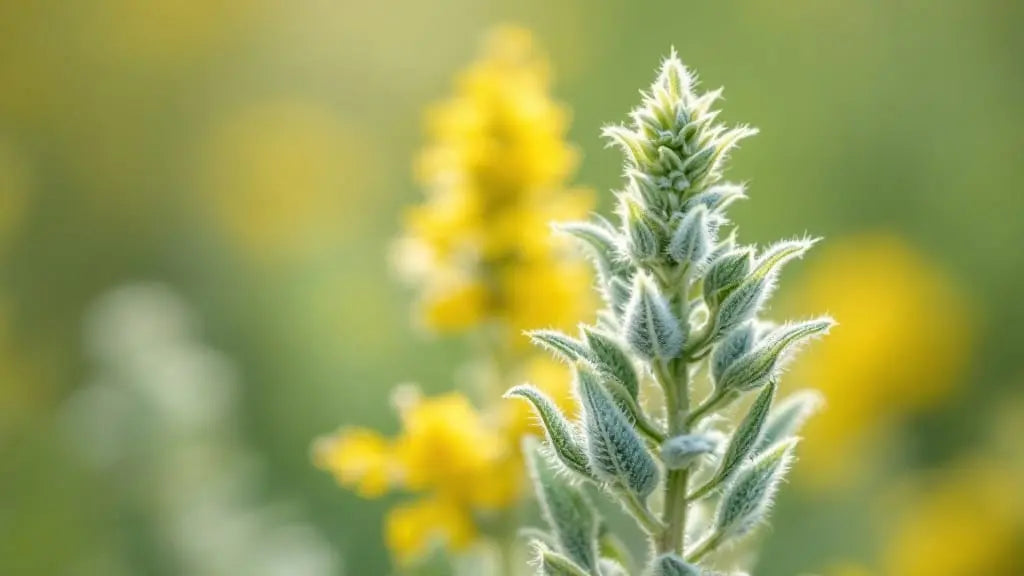了解贫血和草药支持
贫血是一种影响全球数百万人的疾病,其特征是缺乏健康的红细胞或血红蛋白。这种缺陷会导致疲劳、虚弱和呼吸急促等症状。虽然传统治疗方法通常涉及补铁或改变饮食,但大自然提供了一系列草药,可以帮助维持铁水平,改善红细胞生成并对抗贫血症状。
荨麻、黄酸模和辣木等草药富含营养,可提供植物性铁和其他重要营养素,满足身体需求。在本文中,我们将探讨治疗贫血的顶级草药、它们的益处以及如何在日常生活中有效使用它们。
什么是贫血?

贫血是一种疾病,当您的身体无法产生足够的健康红细胞或血红蛋白(负责输送氧气到全身的蛋白质)时就会发生这种疾病。
常见的贫血类型
- 缺铁性贫血:最常见的一种贫血,由铁含量不足引起。
- 维生素 B12 缺乏性贫血:当身体缺乏足够的维生素 B12 来产生红细胞时就会发生这种情况。
- 叶酸缺乏性贫血:因缺乏叶酸而引起,叶酸对于红细胞的生成至关重要。
贫血的症状
- 疲劳和虚弱
- 皮肤苍白或发黄
- 气促
- 头晕或头昏
- 手脚冰冷
了解贫血的根本原因对于选择正确的治疗方法至关重要。草药可以补充医疗干预措施并支持整体康复。
贫血和草药:古老的治疗方法
纵观历史,早在现代医学出现之前,世界各地的文化就已开始使用草药来治疗贫血症状。古代医士认识到植物滋养身体、补充血液和恢复活力的功效。
古埃及疗法
古埃及人是最早记载使用草药治疗血液相关问题的人之一。他们使用富含铁的蒲公英根和荨麻叶来治疗疲劳和皮肤苍白等症状。这些草药经常被煮成滋补品或与蜂蜜混合以使其更可口。
传统中医
在传统中医中,贫血症被视为“气”(生命能量)和血液不足的病症。当归等草药被称为“女性人参”,用于促进血液生成和循环。中医师还使用富含营养的枸杞来补血和对抗虚弱。
阿育吠陀疗法
在印度传统医学体系阿育吠陀中,贫血被称为“Pandu”,被认为是由身体体液失衡引起的。阿育吠陀医生使用辣木和南非醉茄等草药来恢复体力和精力。他们还强调将富含铁的草药与三果等消化促进剂结合起来以改善营养吸收的重要性。
欧洲民间医学
在中世纪的欧洲,黄芩根和荨麻是治疗血液疾病的常见药物。草药师将它们泡成茶来“净化血液”并自然提高铁含量。这些疗法代代相传,至今仍然很受欢迎。
草药的永恒智慧
令人着迷的是,许多古老的疗法与现代科学发现相吻合。几个世纪前用于治疗贫血症状的草药现在因其高铁含量、生物利用度和支持红细胞生成的能力而受到认可。
回顾历史,我们可以看到草药在治疗贫血方面有多么根深蒂固。这些古老的传统提醒我们,许多健康挑战的答案往往可以在自然界中找到。
草药如何帮助贫血恢复

草药通过针对贫血的根本原因和症状,提供了一种治疗贫血的自然有效的方法。
1. 富含铁的草药
荨麻和黄芩等草本植物富含植物铁,这是血红蛋白生成的关键营养素。
2. 增强铁的吸收
某些草药,例如蒲公英根,可以改善消化并提高身体吸收膳食铁的能力。
3. 促进红细胞生成
螺旋藻和辣木等超级食物含有刺激红细胞生成的必需营养素。
4. 对抗疲劳
像南非醉茄这样的适应原有助于减轻疲劳并恢复能量水平。
使用草药治疗贫血的益处
1. 对胃温和
与合成铁补充剂不同,草药疗法不太可能引起便秘或恶心等副作用。
2. 整体健康支持
草药不仅可以治疗贫血,还可以改善消化、减少炎症和增强免疫力。
3. 天然能量提升
富含铁的草药与适应原结合可以恢复能量和活力。
4. 无障碍且可持续
草药提供了一种比合成疗法更环保的替代品,有利于个人和地球的健康。
治疗贫血的顶级草药及其用途
荨麻
- 优点:富含铁、维生素 C 和 K 以及叶绿素;支持红细胞的生成。
- 使用方法:泡茶或将新鲜叶子加入汤和炖菜中。
黄色码头
- 优点:含有植物铁,促进消化,更好地吸收营养。
- 使用方法:用作酊剂或茶。
蒲公英根
- 好处:促进肝脏健康并增强铁的吸收。
- 使用方法:泡茶或制成胶囊服用。
螺旋藻
- 优点:营养丰富的超级食品,富含生物可利用的铁和 B 族维生素。
- 使用方法:将粉末添加到冰沙中或制成胶囊服用。
辣木
- 优点:富含铁、钙和抗氧化剂;支持红细胞的生成。
- 使用方法:添加到茶、汤或冰沙中。
南非醉茄
- 益处:作为一种适应原,可减轻疲劳并提高整体活力。
- 使用方法:泡茶或作为补充剂服用。
帮助贫血的 DIY 食谱

1. 补铁荨麻蒲公英茶
原料:
指示:
- 将草药放入茶壶中,倒入热水。
- 浸泡 10 分钟,过滤,然后加入蜂蜜调味。
- 每天享用可补充铁含量。
2. 螺旋藻能量奶昔

原料:
- 1茶匙螺旋藻粉
- 1 香蕉
- 1/2 杯杏仁奶
- 1茶匙蜂蜜
指示:
- 将所有材料搅拌至顺滑。
- 作为营养丰富的早餐或零食享用。
3. 黄码头和辣木补品

原料:
- 1 茶匙 干黄芪根
- 1 茶匙辣木粉
- 1杯热水
指示:
- 将黄芪根浸泡在热水中 10 分钟。
- 过滤并加入辣木粉搅拌。
- 慢慢啜饮以促进铁的吸收。
4. 富含铁的药材汤

原料:
指示:
- 在大锅中,炒蒜末,直至发出香味。
- 加入蔬菜汤、藜麦、胡萝卜和菠菜,煮沸。
- 加入荨麻叶(如果使用干荨麻叶,则将其浸泡在茶包中并在食用前取出),用小火煮 10 分钟。
- 加入辣木粉,用盐和胡椒调味,搅拌均匀。
- 温热后作为营养丰富、富含铁的膳食,有助于贫血的恢复。
治疗贫血的天然方法
-
铁与维生素 C 搭配:
- 柑橘类水果、西红柿或甜椒可以增强铁的吸收。
-
保持活跃:
- 轻度运动可改善血液循环并提高能量水平。
-
练习压力管理:
- 使用瑜伽或冥想等放松技巧来减轻疲劳。
-
保持一致:
- 定期使用草药可获得持续的益处。
你知道吗?植物的铁含量比肉类更丰富
你可能会惊讶地发现,某些植物性食物和草药每份所含的铁比某些肉类还要多。例如, 荨麻叶的铁含量很高,按重量计算,可与红肉相媲美甚至超过红肉。再加上其维生素 C 含量,可增强铁的吸收,荨麻是治疗贫血的强力药物。
同样,蓝绿藻螺旋藻每 100 克含铁量高达 28.5 毫克,远高于同等数量的牛肉。这些植物性食品不仅提供铁,还提供多种其他营养成分,如抗氧化剂、维生素和矿物质,使其成为整体健康支持的理想选择。
通过在饮食中加入富含铁的草药,您不仅可以治疗贫血,还可以为您的身体提供营养丰富的补充,有益于整体活力和健康。
关于治疗贫血的草药的常见问题
草药可以代替铁补充剂吗?
根据贫血的严重程度,草药可以补充或替代补充剂。请务必咨询医疗保健提供者。
这些草药对于每个人来说都安全吗?
大多数草药只要正确使用都是安全的,但孕妇或哺乳期妇女应咨询医生。
要多久才能看到结果?
通常需要持续使用数周才能看到改善。
利用草药自然恢复精力

贫血会损害您的精力和整体健康,但天然草药可提供温和有效的解决方案。通过将荨麻、黄酸模和螺旋藻等营养丰富的草药纳入您的日常生活,您可以支持红细胞生成、改善铁吸收并恢复活力。





